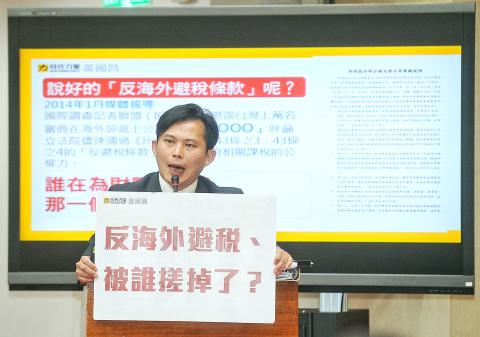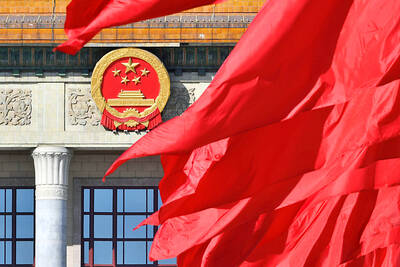The Democratic Progressive Party (DPP) and the New Power Party (NPP) caucuses held separate news conferences yesterday proposing to amend the Income Tax Act (所得稅法) to curb tax evasions in the wake of the “Panama Papers” revelations.
The DPP caucus said it is to propose amendments that would add “anti-tax-evasion clauses” to the law as one of the party’s priority bills in this legislative session.
It added that the Executive Yuan had in 2012 proposed amendments to the act, aiming to introduce regulations for taxing profit-seeking enterprises based on internationally recognized rules regulating “controlled foreign corporations,” but the draft had failed to receive a positive response in the legislature.

Photo: Liu Hsin-de, Taipei Times
The DPP accused the Chinese Nationalist Party (KMT) caucus of blocking the amendments in the past by referring the bill to further cross-caucus negotiations, which had stalled its passage.
New Power Party Chairman Huang Kuo-chang (黃國昌) also said it would propose amendments to target tax avoidance.
“We have to push for new articles targeting overseas tax avoidance, because some corporations earn a tonne of money, but end up paying very little in taxes,” Huang said, adding that corporations used financial gimmickry to run up losses at home while registering profits abroad.
The party’s amendment would mandate that firms controlled domestically would be taxed in accordance with full domestic rates, even if they were officially registered abroad.
The “Panama Papers” purport to outline how Panama-based law firm Mossack Fonseca has assisted individuals and enterprises to evade financial oversight and taxation. The firm reportedly had at least 16,785 Taiwanese clients, with a full list to be published next month.
The NPP is also to propose amendments to the Act Governing the Exercise of Legislative Power (立法院職權行使法) to more closely specify the confirmation process for central government officials.
“After [DPP president-elect] Tsai Ing-wen (蔡英文) takes office on May 20, there will gradually be a series of nominations to the Control Yuan and Council of Grand Justices. We feel that before this takes place there should be new reform measures enacted to guarantee the quality of legislative review during the confirmation process,” NPP Legislator Hsu Yung-ming (徐永明) said.
Amendments advocated by the party would require signed balloting on all nominations, as well as requiring that public hearings be held, the nominees be questioned individually on their views on public policies and social issues, and at least two months to be spent on review.
While officials within the Executive Yuan can be appointed directly by the president, nominations of top officials in the Judicial Yuan, Control Yuan and Examination Yuan require legislative consent.
KMT Legislator-at-large William Tseng (曾銘宗), who is also the former Financial Supervisory Commission chairman, said the KMT caucus had called for cross-caucus negotiations for the amendment because the cross-strait taxation agreement — which would be a supporting measure to the amendment — had been nonexistent, and since the agreement has now been signed, the KMT caucus would support the direction of the anti-tax-evasion cause.
Meanwhile, the Ministry of Finance yesterday said it is to work with the International Consortium of Investigative Journalists (ICIJ) to investigate potential violations of tax codes by Taiwanese individuals and companies in connection with the Panama Papers.
The ministry is to set up a special task force right away and cooperate with ICIJ in decoding documents involving more than 16,000 Taiwanese companies and individuals who might have used offshore accounts to cover up tax evasion, money laundering and other irregular activities, Minister of Finance Chang Sheng-ford (張盛和) told the legislature’s Finance Committee.
“The ministry is serious about the probe this time and will track down irregularities, if there are any,” Chang said after lawmakers questioned his resolve.
KMT lawmakers in 2013 staved off an anti-tax evasion bill on concerns it could have estranged Taiwanese businesspeople based in China, even though the Finance Committee had approved the bill.
The ministry is to submit the bill to the Cabinet again today and the elections of new lawmakers in January should help facilitate the legislative process, Chang said.
A successful probe requires a legal mechanism and information sharing pacts with foreign countries involved, he said.
The bill can arrive in the legislature next week and become law by the end of this session if lawmakers give the go-ahead, he said.
Offshore financial dealings are not illegal in themselves, but can be used to hide assets from tax authorities, launder the proceeds of criminal activities or conceal misappropriated or politically inconvenient wealth.
In related developments, an older brother of Tsai was named in the so-called Panama Papers as setting up an offshore company in 2008, his lawyer said yesterday, adding that he had done nothing illegal.
However, the news prompted criticism from Tsai’s political opponents, who called for a full explanation.
Tsai’s brother, Tsai Ying-yang (蔡瀛陽), set up the offshore firm in 2008 at the recommendation of a foreign private banking adviser on personal investments, his lawyer, Lien Yuan-lung (連元龍), told Reuters, declining to elaborate.
“He lost 30 percent of the investment in the first year, so he closed the contract with the bank immediately,” Lien said by telephone. “He was not involved in money laundering, hiding the Tsai family’s wealth overseas, evading tax or anything illegal.”
Additional reporting by Reuters

US PUBLICATION: The results indicated a change in attitude after a 2023 survey showed 55 percent supported full-scale war to achieve unification, the report said More than half of Chinese were against the use of force to unify with Taiwan under any circumstances, a survey conducted by the Atlanta, Georgia-based Carter Center and Emory University found. The survey results, which were released on Wednesday in a report titled “Sovereignty, Security, & US-China Relations: Chinese Public Opinion,” showed that 55.1 percent of respondents agreed or somewhat agreed that “the Taiwan problem should not be resolved using force under any circumstances,” while 24.5 percent “strongly” or “somewhat” disagreed with the statement. The results indicated a change in attitude after a survey published in “Assessing Public Support for (Non)Peaceful Unification

The CIA has a message for Chinese government officials worried about their place in Chinese President Xi Jinping’s (習近平) government: Come work with us. The agency released two Mandarin-language videos on social media on Thursday inviting disgruntled officials to contact the CIA. The recruitment videos posted on YouTube and X racked up more than 5 million views combined in their first day. The outreach comes as CIA Director John Ratcliffe has vowed to boost the agency’s use of intelligence from human sources and its focus on China, which has recently targeted US officials with its own espionage operations. The videos are “aimed at

‘MISGUIDED EDICT’: Two US representatives warned that Somalia’s passport move could result in severe retaliatory consequences and urged it to reverse its decision Minister of Foreign Affairs Lin Chia-lung (林佳龍) has ordered that a special project be launched to counter China’s “legal warfare” distorting UN Resolution 2758, a foreign affairs official said yesterday. Somalia’s Civil Aviation Authority on Wednesday cited UN Resolution 2758 and Mogadishu’s compliance with the “one China” principle as it banned people from entering or transiting in the African nation using Taiwanese passports or other Taiwanese travel documents. The International Air Transport Association’s system shows that Taiwanese passport holders cannot enter Somalia or transit there. The Ministry of Foreign Affairs (MOFA) protested the move and warned Taiwanese against traveling to Somalia or Somaliland

SECURITY: Grassroots civil servants would only need to disclose their travel, while those who have access to classified information would be subject to stricter regulations The government is considering requiring legislators and elected officials to obtain prior approval before traveling to China to prevent Chinese infiltration, an official familiar with national security said yesterday. President William Lai (賴清德) in March announced 17 measures to counter China’s growing infiltration efforts, including requiring all civil servants to make trips to China more transparent so they can be held publicly accountable. The official said that the government is considering amending the Act Governing Relations Between the People of the Taiwan Area and Mainland Area (臺灣地區與大陸地區人民關係條例) to require all civil servants to follow strict regulations before traveling to China.